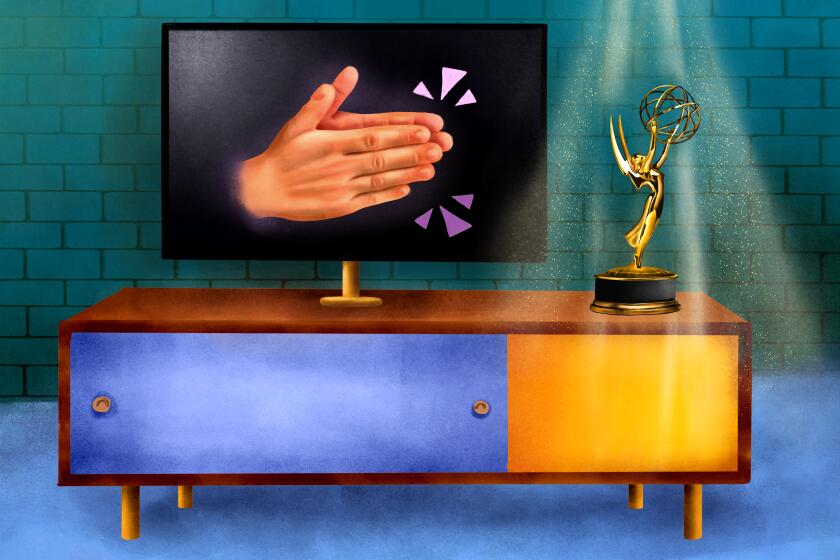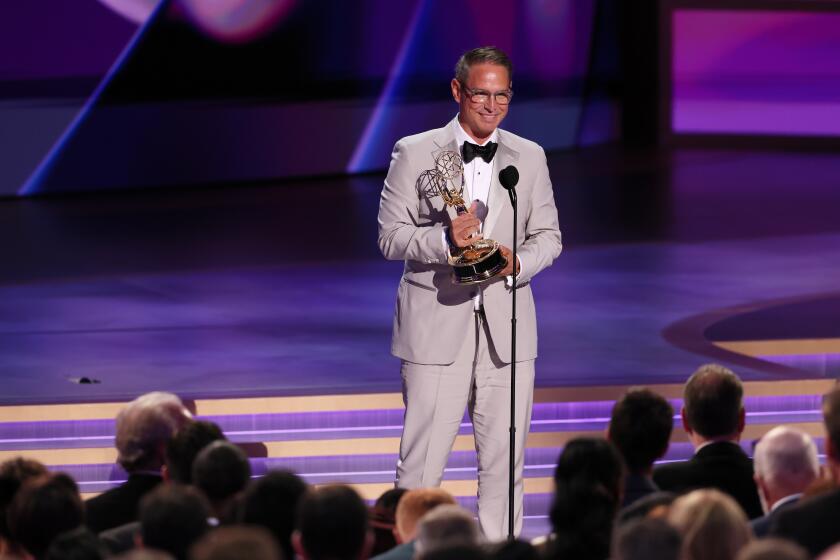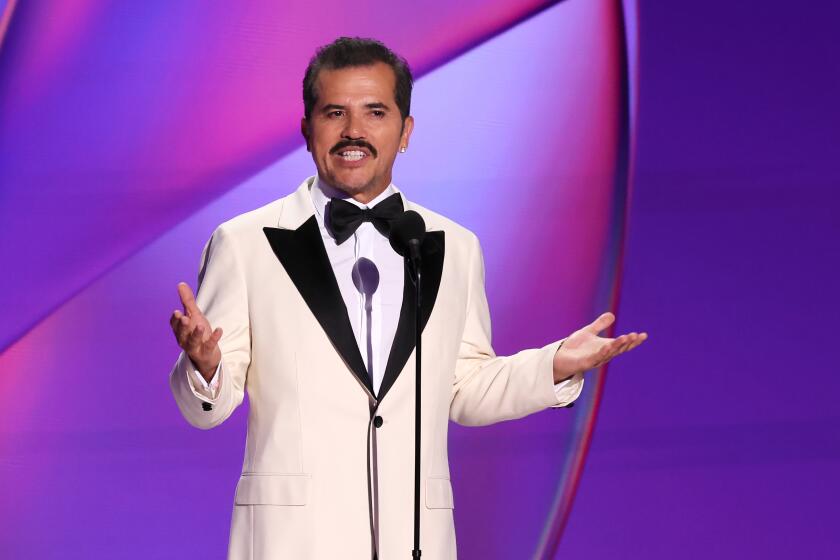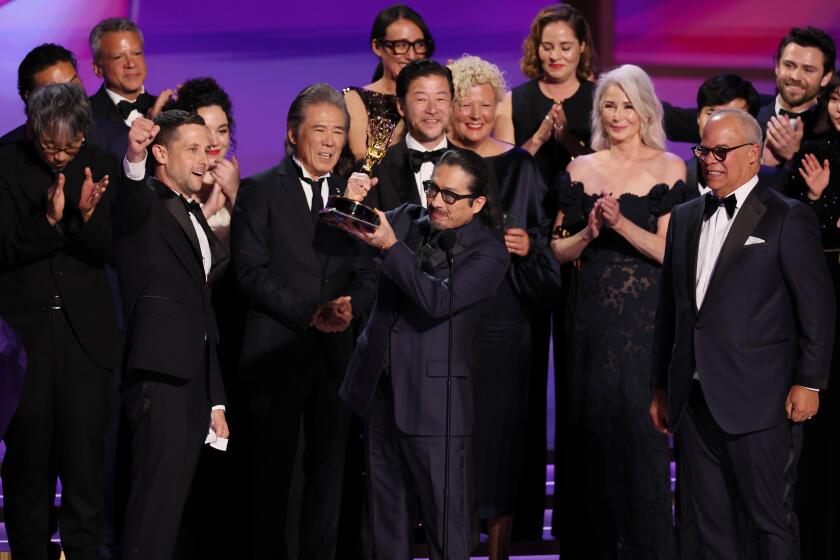The world is on fire. Why should we care about the Emmys?
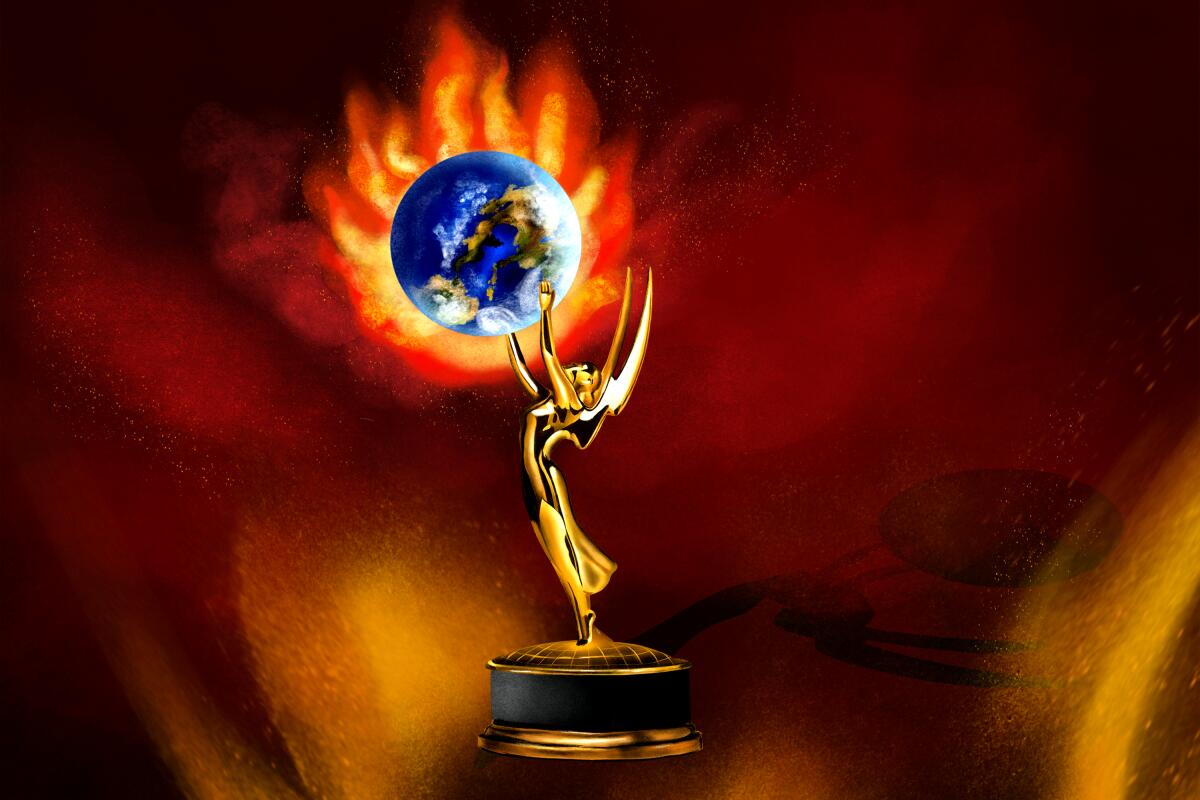
- Share via
Even in a normal year, it takes a lot to get me to care about the Emmy Awards — in fact, I never really care about the Emmys, apart from being happy to see artists I like win, because it’s nice for them. But many, many, many more artists whose work I like will not win, or be nominated, and I would hate to think that matters.
This is not a normal year. The West Coast is on fire. A thousand Americans a day die from a disease much of the rest of the industrialized world has been able to keep relatively in check. There is fighting in the streets. A television-personality politician is attempting to stay in office by creating exactly the sort of drama on which television thrives, and we are at war over things we should agree on — like, science and racism — as we sit before our multiple screens and try to process or ignore what might be the end of democracy, locally, and of the world as we know it, globally. Screaming through one’s waking hours, and even in one’s sleep, does not seem an inappropriate response.
And so as we tumble through the final months of a real-world contest whose outcome will affect not just the next four years but generations to come, what can the Emmys, whose 72nd edition airs Sunday night on ABC, possibly mean?
As the mere fact of Sunday’s ceremony signifies, no one would think of canceling them; they are too deeply knitted into the calendar of our consciousness. The Oscars, the Emmys, the Grammys and the Tonys have the ritual annual authority of Christmas, Yom Kippur and Ramadan. For most of us they have always been around, like mountains, like the ocean. (The youngest, the Grammys, is over 60; for that matter, many people well into middle age will not remember a world without MTV’s Video Music Awards.)
Millions the world over watch these self-admiring pageants of triumph and tragedy, many trusting they say something definitive about the art, though ready to declare those decisions wrong. (Some just watch for the glitter, to be sure.) The media — yes, hello — piggyback on that interest and for as long as is practicable whip up stories of speculation and celebration. Call it the entertainment-informational complex. It’s just good business, which is to say, inevitable.
The top honor of 2020 — the award for Keeping Us Occupied During the Worst Year Ever — belongs to television itself. Why shouldn’t the Emmys celebrate that?
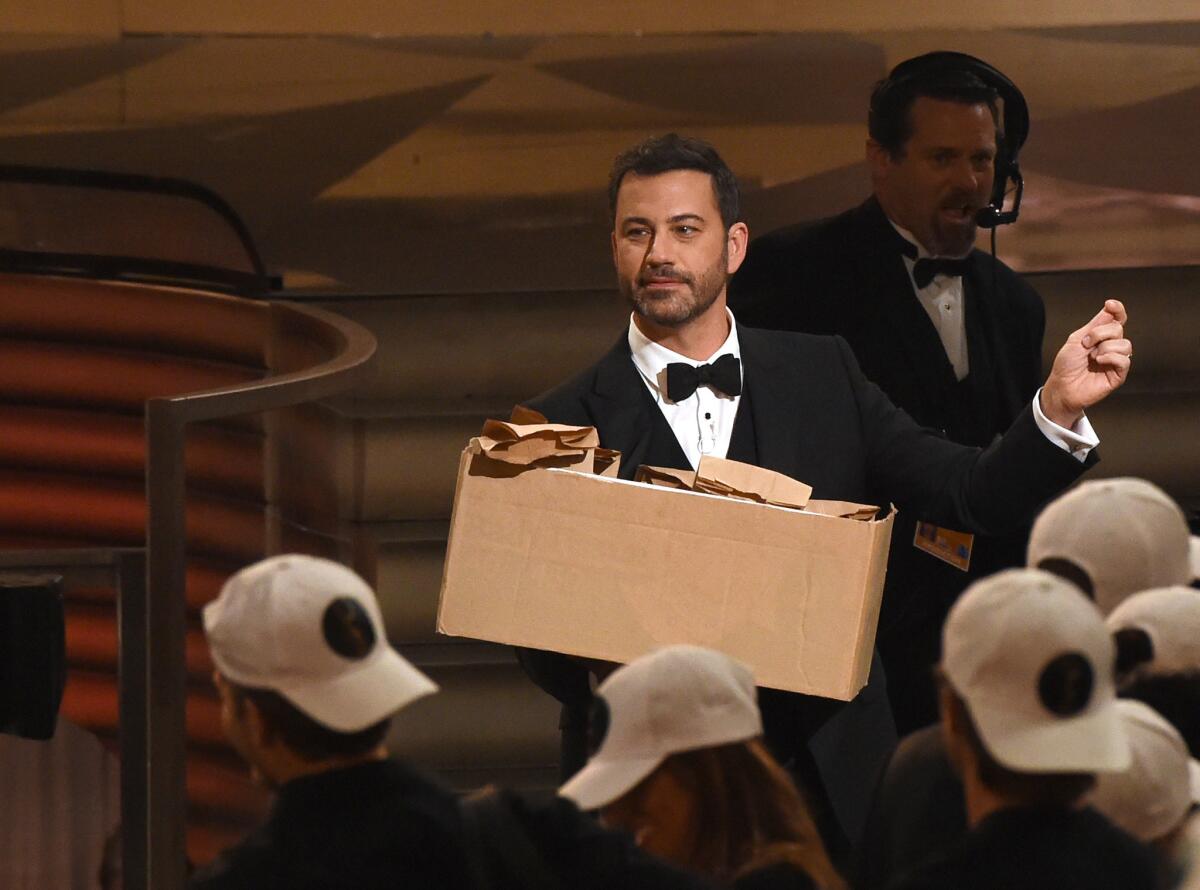
And yet beyond creating an opportunity for vicarious joy or rage, who wins and who loses is practically meaningless for all but a few — the nominees, their families and friends, and people whose livelihoods and business interests are tied up with theirs. The cataloging of “snubs” has itself become a ritual among old-school and social media types and by ordinary viewers just yelling at their television or their friends. (There is no actual snubbing: “Ignored” might be a better term, though even that implies more action than this negative effect involves. “Didn’t win” says it best.) Why anyone needs the added tension on top of all the other tension in the world, I don’t know — perhaps as a distraction from worse tension, like digging a nail into your palm when you’re getting a root canal.
Emmys 2020
Like most things we use to self-medicate, pop culture treats the symptoms but not the cause; it allows you to feel like everything is fine — there is still television! — while the ground turns liquid beneath your feet. On the other hand it is nice to think that even as human life winks out — it’ll happen, one way or the other, your imaginary space colonies notwithstanding — something like entertainment will still exist, with happy songs and jokes and stories, and not just bloody cage matches and junkyard demolition derbies. Even the red carpet might survive into post-apocalyptic dystopia (as distinct from our pre-apocalyptic dystopia): Who are you wearing? Army surplus plus some old punk gear I shoplifted on Melrose.
Laurels have been awarded down through history, but the last century has made a literal production out of them — so many prizes! Television has driven this trend, sanctifying the big events with hours of network prime time, while cable and streaming outlets host or create their own. Giving prizes confers status on the giver as well as the receiver; if you can get enough A-list stars to show up for your prize-giving, you too can be the Golden Globes. And people watch, to be sure. None of this would be happening if that weren’t true.
The major awards shows are typically greeted with a mix of excitement and suspicion that they will fail in some way to live up to their sacred charge. (Not to be boring, in so many words.) In most years there is some fiddling with the basic elements, to Get It Right This Time, but a modern Emmys telecast, much like the Oscars, is basically the same from year to year: a cold-open comic production number; a monologue from the host; a succession of bantering presenters, interspersed with tributes to things the producers have decided it is the right time to pay tribute to; the “in memoriam” segment; possibly another comedy bit; and brief reappearances by the host just to remind you that there is in fact a host. I expect this will hold true for the quarantine Emmys as well in some unpredictable form.
Awards columnist Glenn Whipp offers his predictions on who will, should and could win at the 2020 Emmy Awards, including ‘Watchmen’ and ‘Schitt’s Creek.’
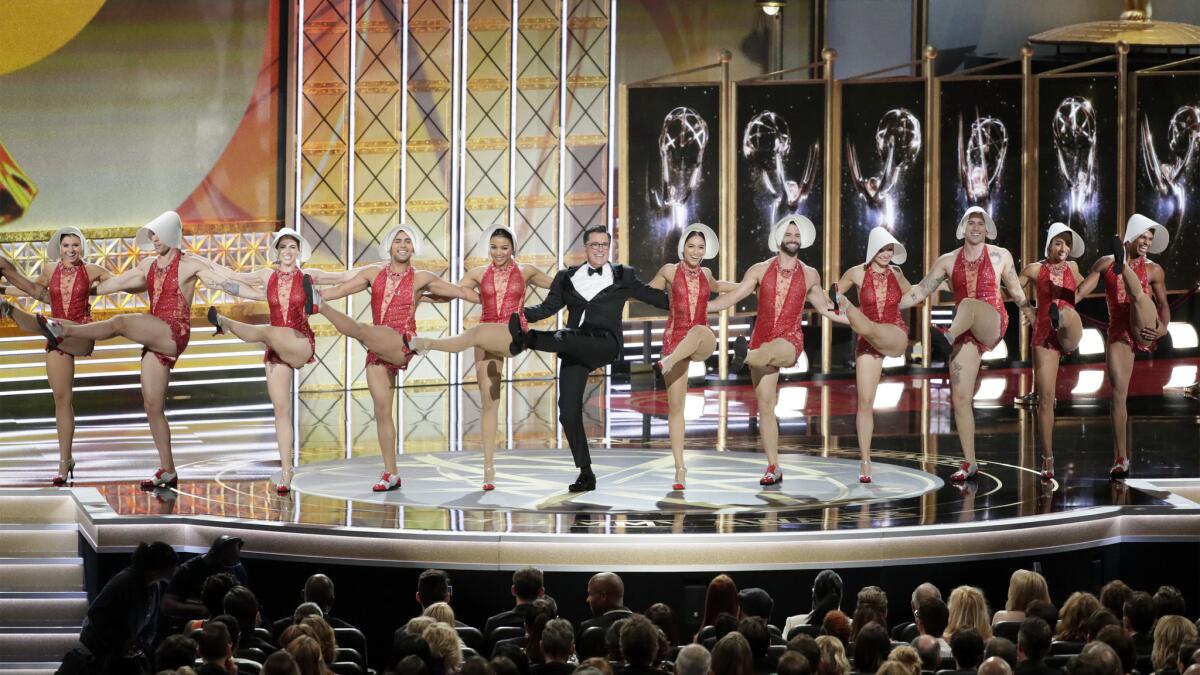
Presumably, the nominees have been informed of the new protocols — dress codes, speech lengths, turning their cellphone horizontal — as production teams puzzle out how to create the impression of a glamorous occasion at a distance, from a great number of nearly empty rooms. What can take the place of rows and rows of stars reacting in the room to jokes made at their expense, or the thrilling battle of winner against orchestra as the clock runs out on an acceptance speech? As nominees are typically shown in a mosaic as the winner is announced, which looks like a Zoom call, that part at least might be pretty much as usual.
We have seen some quarantine-defined awards shows already — the BET Awards, the VMA Awards, the Daytime Emmys. The Academy of Country Music Awards will take place between this writing and the Emmys. And that’s not to mention two political conventions, which are awards shows of a sort. It can be done. Still, the Emmys is of a different order. It’s the E in EGOT, its Hollywood mojo is second only to the Oscars, and it is 72 this year. It has eminence, weight, tradition. We know how it’s supposed to work, what it looks like.
In uncertain times, enacting old rituals brings a modicum of normalcy, a promise that things might go on in the future as they have in the past. The problem is that feelings of normalcy are deceptive; we get used to all sorts of things we should permanently regard as abnormal. And maybe not everything should go on as it has. This capacity for compartmentalization keeps us sane, but it makes it easy to ignore the flames licking at your feet while the AC keeps your head cool. That’s entertainment: It makes us happy in awful times, but in being happy we neglect to tend to what makes the times awful. It puts the “lax” in relax.
Notably, the series up for Emmys on Sunday were produced, or substantially finished, before the viral curtain came down, a fact that might lend the evening an air of wistfulness, a touch of nostalgia for the messy simple life we thoughtlessly used to lead, and a heaping helping of cognitive dissonance. And because the simple act of taking the pandemic seriously is considered partisan, the fact this is not being held in a big auditorium full of maskless stars makes it a political event. The virus itself is an implied presence (though it is not scheduled to present). Even pretending otherwise would be to acknowledge it, in the same way that not voting is, in a sense, voting.
Thanks to COVID-19, Reginald Hudlin, the first Black executive producer in Emmys history, has many unknowns to plan for. But don’t expect ‘The Zoomies.’
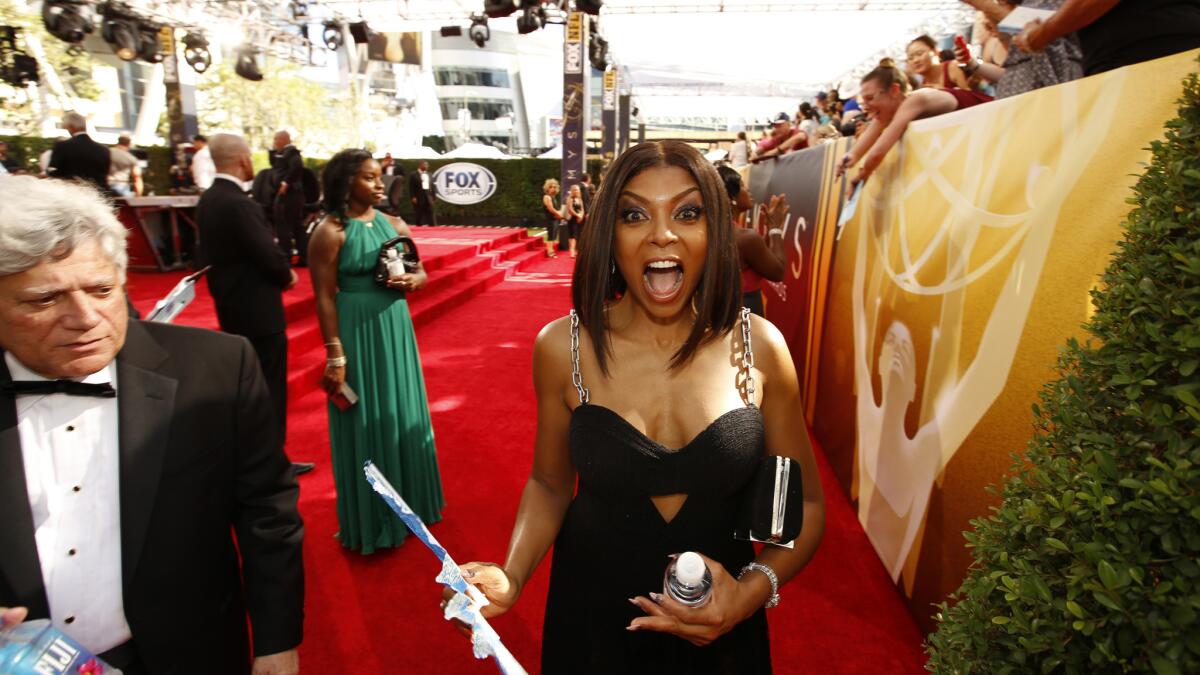
Notwithstanding everything I’ve just said, there are reasons to welcome the awards. Past making the winners happy, an Emmy might do some practical good. It can validate an independent voice or a social movement: A big night for “Watchmen” will be regarded as socially significant (and therefore be socially significant). It might help a less-watched show get noticed — “Fleabag” was hardly a household name when it swept up an armload of statuettes last year — or a show on the edge of cancellation survive. And certainly they may be entertaining — fun, which I can almost remember having — and even inspirational. Indeed, given everything we’re going through, I would expect at least a few eloquent indictments of the way we’re living now.
And for the nominees themselves, well, not having any Emmys at all would be like not getting a graduation and a graduation party; a socially distanced affair might be better than none. We will soon know whether this substitute celebration is more like picking up a drive-by diploma or the Democratic National Convention, which was widely seen as such a welcome change from the usual convention center brouhaha that, you know, maybe we should just do that from now on. Indeed, like the COVID convention, the 2020 Emmys might prove to be illuminating in ways it never would have been had business continued as usual. But it will triumph merely by discharging its twin missions — to hand out prizes and fill up three hours of commercial-filled prime-time television. Take that, novel coronavirus!
And we can’t spend all day screaming, after all.
More to Read
The complete guide to home viewing
Get Screen Gab for everything about the TV shows and streaming movies everyone’s talking about.
You may occasionally receive promotional content from the Los Angeles Times.
